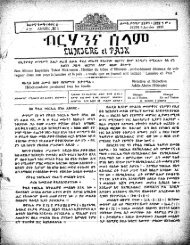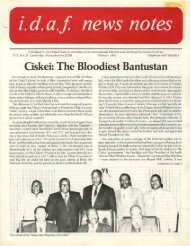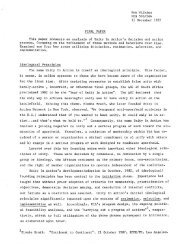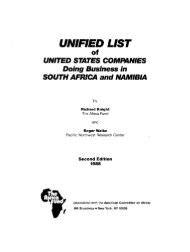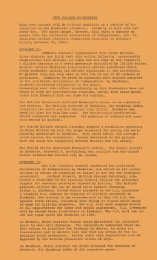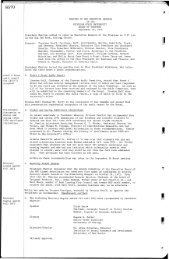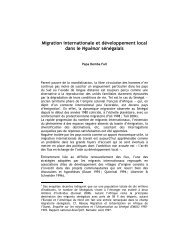the churches and southern africa - KORA
the churches and southern africa - KORA
the churches and southern africa - KORA
Create successful ePaper yourself
Turn your PDF publications into a flip-book with our unique Google optimized e-Paper software.
SACTU APPEALS FOR SOLIDARITY AT THE ILO<br />
MEETING<br />
At <strong>the</strong> June meeting of <strong>the</strong> International Labor<br />
Organization in Geneva, <strong>the</strong> South African Congress of<br />
Trade Unions appealed for solidarity with <strong>the</strong> struggle of<br />
black workers in South Africa. At <strong>the</strong> same time, <strong>the</strong><br />
I LO's director-general called for a "fundamental<br />
transformation of South Africa into a society offering<br />
equal rights <strong>and</strong> opportunities, <strong>and</strong> a just share in its<br />
wealth, to all its citizens."<br />
Mr. Mark William Shope, Secretary General, <strong>and</strong> M s.<br />
Ray Alex<strong>and</strong>er executive committee member,<br />
represented SACTU at <strong>the</strong> I LO meeting, which was<br />
attended by delegates from governments, employers<br />
organizations, <strong>and</strong> labor unions from most countries. In a<br />
memor<strong>and</strong>um circulated to all delegates, SACTU asked<br />
for assistance in winning certain basic rights:<br />
1. Democratic rights-one man, one vote.<br />
2. Abolition of pass laws-<strong>the</strong> badge of slavery.<br />
3. The legal recognition of African trade unions. The<br />
right to collective bargaining <strong>and</strong> to strike.<br />
4. The abolition of industrial color bars.<br />
5. The obolition of migratory labor systems.<br />
6. The abolition of <strong>the</strong> compound (barracks) system.<br />
7. No sale of arms to South Africa.<br />
8. No trade with South Africa.<br />
9. No technicians or any skilled manpower to go to<br />
South Africa.<br />
(Sources: SACTU memor<strong>and</strong>um; excerpts have been<br />
published in U.N. Document 14/72, Unit on Apar<strong>the</strong>id,<br />
ILO Director General, U.N. Document 13/72, Unit on<br />
Apar<strong>the</strong>id.)<br />
BOO K REVIE W<br />
INSIPE NAMIBIA: a booklet published on US Business<br />
in I/mibia<br />
The Africa Fund (associated with <strong>the</strong> American<br />
Committee on Africa) has joined with <strong>the</strong> Program to<br />
Combat Racism of <strong>the</strong> World Council of Churches to<br />
publish a booklet entitled NAMIBIA: U.S. CORPORATE<br />
INVOLVEMENT. Beginning with a brief economic<br />
portrait of <strong>the</strong> territory, <strong>the</strong> publication presents a survey<br />
of American policy, investment, exploration, <strong>and</strong> trade.<br />
Detailed treatment is given to <strong>the</strong> Tsumeb Corporation<br />
owned by Newmont Mining Corporation <strong>and</strong> American<br />
Metals Climax.<br />
Authors Winifred Courtney .<strong>and</strong> Jennifer Davis<br />
conclude that a neutral role for U.S. Corporations is<br />
impossible. The basic conflict between African people <strong>and</strong><br />
<strong>the</strong> white minority government dictates that foreign<br />
business activity "plays an important role in bolstering<br />
<strong>the</strong> illegal South African regime. " by contributing taxes<br />
<strong>and</strong> foreign exchange. Fur<strong>the</strong>r, it legitimizes South<br />
Africa's political control <strong>and</strong> depletes non-renewable<br />
mineral resources.<br />
The 32-page pamphlet calls for <strong>the</strong> education <strong>and</strong><br />
mobilization of many thous<strong>and</strong>s of Americans "to end<br />
U.S. aid <strong>and</strong> comfort for South African racism." It can be<br />
ordered from The Africa Fund, 164 Madison Avenue,<br />
New York, N.Y. 10016 at a cost of $.50 each.<br />
INSIDE<br />
NAMIBIA<br />
NAMIBIA STIFFENS RESISTANCE TO SOUTH<br />
AFRICAN CONTROL<br />
In a joint statement released by <strong>the</strong> headmen <strong>and</strong> tribal<br />
executive, <strong>the</strong> Damara people of Namibia have refused to<br />
accept South Africa's proposal to grant "partial<br />
self-government" to <strong>the</strong>ir designated homel<strong>and</strong> in <strong>the</strong><br />
territory's far northwest. Only about 10% of <strong>the</strong> 60,000<br />
Damaras live in <strong>the</strong> prescribed area.<br />
The proposal is part of a South African scheme to<br />
divide Namibia into 12 separate areas for <strong>the</strong> African<br />
population, <strong>the</strong>reby diffusing organized opposition to<br />
occupation by South Africa. In late June <strong>the</strong><br />
Government-appointed Chief Councilor of <strong>the</strong> Ovambos,<br />
whose people form <strong>the</strong> majority of <strong>the</strong> Namibian<br />
population, announced that Pretoria had fixed a timetable<br />
to grant a larger measure of autonomy to <strong>the</strong> Ovambo<br />
area.<br />
Damaras are <strong>the</strong> second largest ethnic group in <strong>the</strong><br />
territory, <strong>and</strong> up to now have been regarded by <strong>the</strong> South<br />
African Government as compliant. The Johannesburg Star<br />
sees <strong>the</strong> Damaras' rejection of <strong>the</strong> Bantustan plan as "an<br />
ultimatum which threatens to wreck its plans to apply its<br />
policy of multinational development to <strong>the</strong>ir people."<br />
(Aug. 7, 1972)<br />
The statement described <strong>the</strong> "so-called Damara<br />
homel<strong>and</strong>" as part of a policy under which "we are being<br />
systematically disinherited <strong>and</strong> made strangers in our<br />
l<strong>and</strong>." Characterizing <strong>the</strong>ir situation as "a form of<br />
slavery," <strong>the</strong>y maintained that <strong>the</strong> country belonged to all<br />
of its people, <strong>and</strong> could not be divided. "We are<br />
dissatisfied with South African administration <strong>and</strong> will<br />
never be satisfied with it," <strong>the</strong>y said.<br />
Like <strong>the</strong> Ovambos, Damaras had been taken for<br />
granted by <strong>the</strong> white Government, which appoints <strong>and</strong><br />
maintains tribal "chiefs" to echo official policy. The<br />
myth of Ovambo acquiescence was shattered last<br />
December when a strike by 15,000 contract laborers<br />
crippled Namibia's economy, halting work at mines <strong>and</strong><br />
factories for three months. In <strong>the</strong> aftermath of <strong>the</strong> strike,<br />
South Africa overhauled <strong>the</strong> system which guaranteed<br />
cheap labor to white-owned industries, <strong>and</strong> set up labor<br />
bureaus to replace <strong>the</strong> centralized South West African<br />
Native Labour Association.<br />
Changes were largely cosmetic, however, <strong>and</strong> it is <strong>the</strong><br />
regulations accompanying <strong>the</strong> restructuring which have<br />
provoked Damara leaders. Among <strong>the</strong> new requirements is<br />
compulsory registration of black women for work in <strong>the</strong><br />
white-controlled towns.


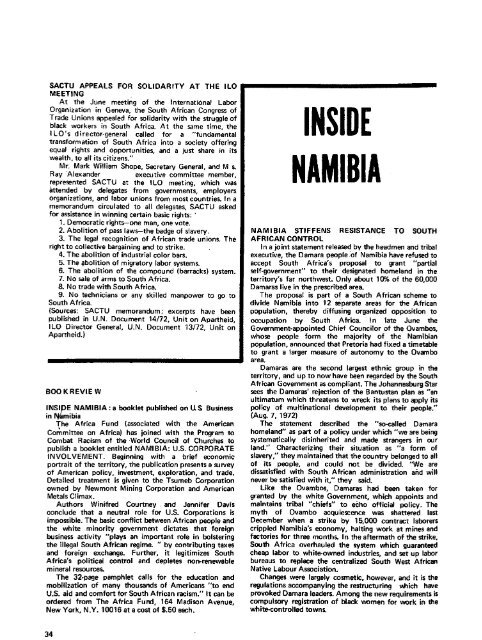
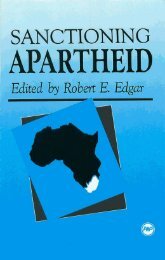
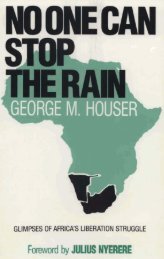

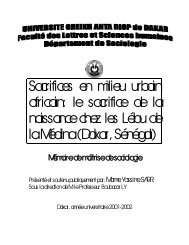
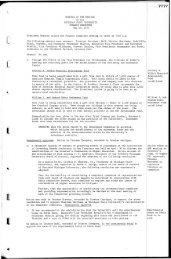
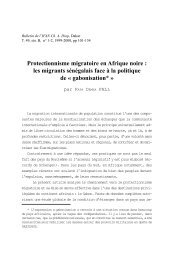
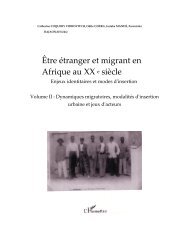
![Synthèse [6] DEFALL..INSTRAW.pdf - Matrix](https://img.yumpu.com/17880734/1/190x245/synthese-6-defallinstrawpdf-matrix.jpg?quality=85)
